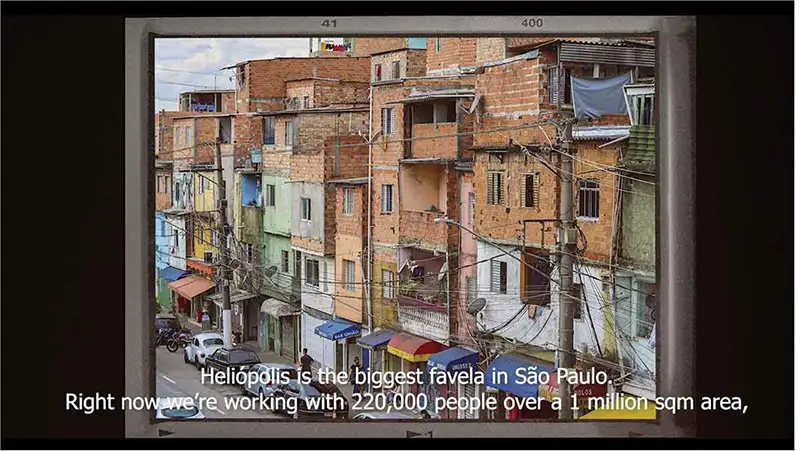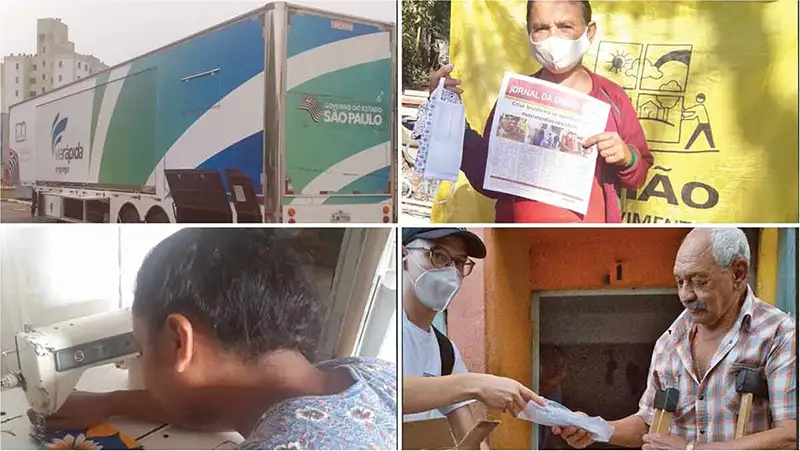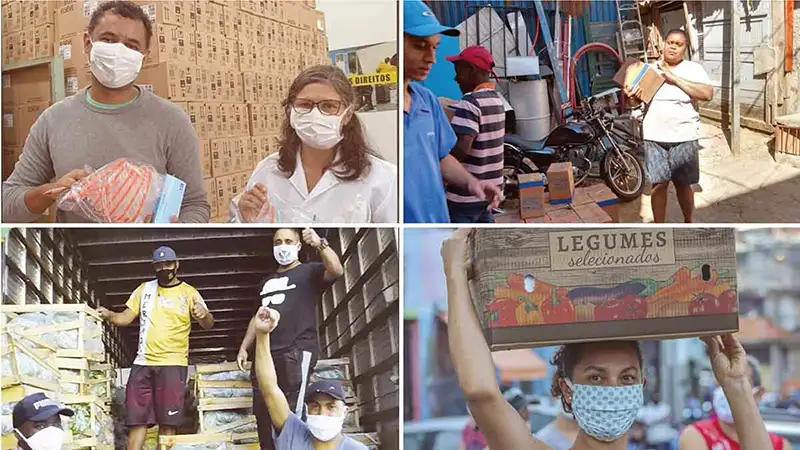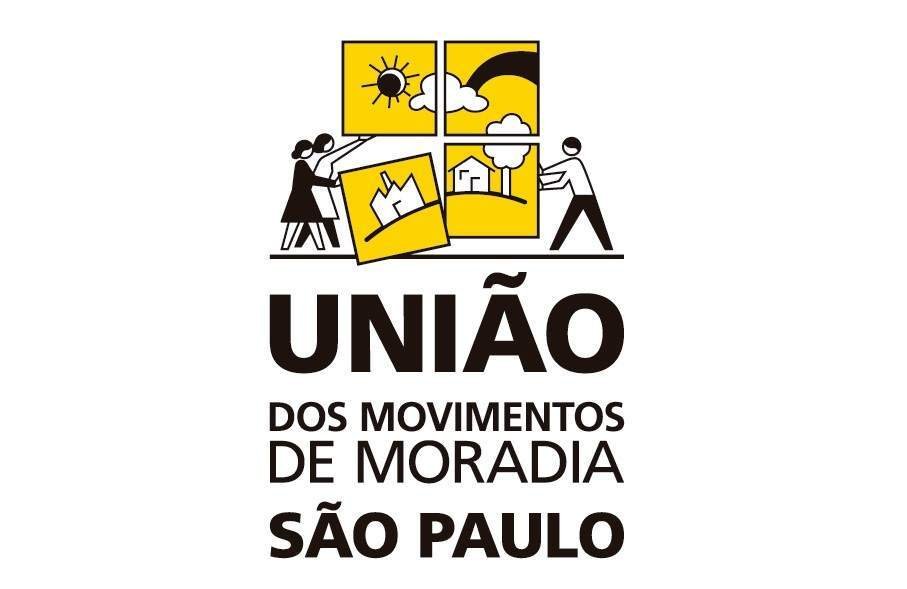Publicado originalmente em: https://www.tandfonline.com/eprint/JJPKIRJVWDBWEQVP2FJJ/full?target=10.1080/23748834.2022.2111192
RESUMEN
São Paulo fue uno de los epicentros de la pandemia de COVID-19 en Brasil y su impacto fue severo entre las poblaciones más desfavorecidas, especialmente en los residentes de favelas. Este documental relata la creación del Grupo Confianza, compuesto en su mayoría por mujeres líderes comunitarias en favelas de São Paulo y cómo sus acciones inspiraron políticas públicas en Brasil; sus lecciones son ejemplos de gobernabilidad y solidaridad en tiempos de crisis y pueden servir de modelo para otras ciudades de Latinoamérica. El documental describe la historia contada por aquellas líderes comunitarios. Para ver el documental, por favor visite el siguiente link: https://youtu.be/61elJw0oqCY
RESUMO
São Paulo foi um dos epicentros da pandemia da COVID-19 no Brasil e seu impacto foi severo entre as populações desprivilegiadas, especialmente para os moradores de favelas. Este documentário relata a criação do Grupo Confiança, formado principalmente por mulheres líderes comunitárias nas favelas de São Paulo, e como suas ações inspiraram políticas públicas no Brasil. Suas lições são exemplos de governança e solidariedade em tempos de crise e podem servir de modelo para outras cidades da América Latina. O documentário retrata essa história protagonizada por essas líderes comunitárias. Para assistir ao documentário, visite o seguinte link: https://youtu.be/61elJw0oqCY
ABSTRACT
São Paulo was one of the epicenters of the COVID-19 pandemic in Brazil. Amongst underprivileged populations, such as slums residents, the impact of the pandemic was severe. This documentary reports the creation of the Trust Group, made up mostly of women community leaders in São Paulo’s slums, and how their actions inspired public policies in Brazil. Their lessons are examples of governance and solidarity in times of crisis and can serve as models for other cities in Latin America. The documentary describes this history as told by those community leaders. To watch the documentary, kindly visit the following link: https://youtu.be/61elJw0oqCY
COVID-19 pandemic imposed to Brazilians a heavy death toll, surpassing by now more than 669,000 losses. Although Brazil is a world reference in vaccination and public healthcare (i.e. The Unified Health System (Castro et al. 2019), national government supported, throughout the course of the pandemic, some ineffective treatments, as well as minimised the importance of social distance (Lotta et al. 2022). Such policies retarded the vaccination onset and, consequently, augmented the adverse consequences of COVID-19, especially in the less privileged segments of Brazilian population, such as slums residents.
Figure 1 illustrates a street in Heliópolis, the largest favela (slum) in São Paulo. The community has approximately 200,000 residents in an area of 1.500 km2.
Figure 1. Streets of the Favela Heliópolis, São Paulo, Brazil. Source: Image created from the documentary.

The city of São Paulo is among the epicentres of COVID-19 in Brazil. Located in the Southeast region, the city is one of the most populous in the world with 12.33 million inhabitants (2020) concentrated in an area of 1,521 km2. São Paulo is considered a natural laboratory to study how an etiological agent differs its lethality due to social deprivation, highlighting the relationship between disease, vulnerabilities, and territorial inequalities (Lorenz et al. 2021).
The idea for the documentary came about during an event at the International Congress on Urban Health held virtually in 2021. Through this project, we aimed to demonstrate to the scientific community the importance of giving voice to the actions carried out by civil society in combating the various consequences of the pandemic (e.g. unemployment and hunger). Also, how these actions have grown in scale and reached the Brazilian territory, and how they could become an example for other countries, especially in Latin America. For this, we brought together a team of researchers, women community leaders, public managers, and directors and executives from the institutions involved.
In the first minutes of the documentary, Marisa Dolhnikoff, professor at the University of São Paulo Medical School and a reference in the response to COVID-19 in Brazil, emphasizes that the difference between health and disease, between life and death, does not depend only on the action of the virus.
We must shift the focus of our microscope from cell tissue to urban tissue (Marisa Dolhnikoff, University of São Paulo)
In this documentary, we tell about an initiative set in the favelas (slums) of São Paulo, an example of creativity, solidarity, and compassion in search of antibodies and solidarity, citizenship, and hope (Figure 2). An action that started in the favelas and spread throughout Brazil. In the present text, we have chosen to use the term favelas, the Portuguese translation for slums. A favela is a group of precariously built low-income housing units that lack infrastructure (e.g. sewage, water supply, energy, health care, garbage collection, schools, and public transportation). For the Favelas Observatory, the favela definition must not be based on what the favela lacks, but it should be recognized in its socio-territorial specificity and serve as a reference for the elaboration of appropriate public policies for these territories (The Favelas Observatory 2022).s
Figure 2. Participants in the documentary and members of the Trust Group. Source: Image from the documentary.

The Trust Group was created within the Women and Territories Center of the Arq.Futuro Cities Laboratory of INSPER, a non-profit institution dedicated to teaching and research (Arq.Futuro 2022). The purpose of the Center is to bring to the academy community leaders with experience in working in vulnerable territories and discuss actions and public policies aimed at these areas. The Trust Group was created during the pandemic to work collectively with actions to combat the pandemic. The objective was to connect leaders who were on the front line in the fight against COVID-19 in their territories to strengthen actions and support between neglected territories. Through it, priority demands were identified, as well as points of reference for receiving donations, and institutional partners that could contribute with resources, manpower and knowledge. Started in March 2020, the actions took place throughout the year, serving populations in vulnerable regions of the cities of São Paulo and Rio de Janeiro, as well as Xingu villages in Mato Grosso. Food, hygiene, protection and clothing items were distributed; other initiatives included education, information and leisure activities.
With the beginning of the pandemic, women leaders from São Paulo’s favelas began to report on the gravity of the situation, which was rapidly escalating. Unemployment, school closings, and families experiencing hunger. Most of the population in the favelas live off informal employment and have suffered immediate impacts. According to studies conducted during the pandemic, almost 20 million Brazilians said they spent 24 hours or more without having anything to eat. More than half (55%) of the Brazilian population suffered from some type of food insecurity in December 2020 (Rede PENSSAN 2021).s
If nothing gets done, there will be looting at supermarkets(Tomas Alvim, BEI Institute and Arq.Futuro Cities Laboratory)
The Trust Group strengthened in the face of the gravity of the situation. At first, financial resources were transferred to the leaders to take action. The funds came initially from individual private initiatives and, later, from donations from the third sector. Only the leaders could identify the needs, and what criteria to use, such as emergency and priority. At that moment, everyone understood that they had a role as citizens, as a society. The action had to be fast because they knew that the public authority would not have this speed.
As the days went by, the leaders began to identify other difficulties, highlighting many problems that already existed and that were not known by the public authorities or by society. Initially, they distributed basic food baskets, but some people could not afford cooking gas or did not have a stove. The solution found was to distribute ready-to-eat food to this population.
The first solidarity actions were small and among neighbors. As the pandemic progressed and the damage increased, new solutions would need to be created quickly. The ‘face masks project’ emerged in this scenario with two purposes: protection and income generation, since many women in the favelas either had sewing machines or had knowledge of sewing (Figure 3). The initiative has scaled up and spread throughout the Brazilian territory and became the Heroes Wear Masks project (Heróis Usam Máscaras 2022) with the support of financial institutions. More than 12 million masks were produced and delivered to more than 150 social and public organizations in 73 Brazilian cities.
Figure 3. Production and distribution of face masks in favelas of São Paulo, Brazil. Source: Image from the documentary.

Besides the production and distribution of masks, parallel initiatives led by the Trust Group were carried out, such as the distribution of basic food baskets, hygiene kits (Figure 4) and individual protection equipment for health professionals, educational materials for children who were at home with the closing of schools, emotional support program for professionals at the Hospital das Clínicas of the University of São Paulo (the largest Brazilian Hospital) and the community health centers, and a volunteer recruitment program for the field hospitals in São Paulo.
Figure 4. Food and personal protective equipment distribution actions, São Paulo, Brazil. Source: Image from the documentary.

The local action became a national reference and promoted alliances. To make this happen, the BEI Institute was fundamental, acting as a thread that connected those who had the problem with those who wanted to help. The BEI institute develops educational programs and implements projects that stimulate debates and contribute to the formation of public policies. The institute performs on different fronts to promote actions that impact the environment, urban development, and the exercise of citizenship. The fast and organized actions of the Trust Group united community leaders, the private sector, social organizations, and individuals in the fight against COVID-19.
According to Fernando Chucre, manager of the Solidary City Program, all the welfare actions carried out in the municipality were not enough to address the issues that were raised, especially food security, production of masks, hygiene and cleaning products. The program aims to undertake coordinated actions between the public authorities and the organized civil society for humanitarian aid. The cooperation program between the municipal government, the private sector, and the third sector seeks to ensure food security and essential health for the most vulnerable people.
Before the pandemic, 4,500 families were served per month. One month after the pandemic began, the municipality increased to almost 250,000 families per month. Experiences like these may improve public policies, especially concerning governance and the relevance of community leadership.
Several lessons have been learned from the Trust Group’s initiative. The first is the fundamental role of solidarity and compassion in times of crisis.
One of the biggest mistakes we are making is not really recognizing our human origins and insisting on this struggle, each one with their sectorial pain. ‘My sectorial pain is bigger than yours’ – there is no such a thing. We are human beings, and once we come to recognize our origin, our problems will go away”(Carmen Silvia, Community leader, Movimento Sem Teto do Centro)
Because of the pandemic, it became clear that it was necessary to increase the system’s capillarity, identify successful actions, and learn from them. Lessons learned for public authorities, civil society and researchers in the field have shown that trust relationships can build new models of governance, which bring more efficiency and agility to public policies.
So the thousands of people who got involved in these actions in one way or another, some in their own territory, others in a broader scope, they have shown what the meaning of life is, the meaning of their lives, their dedication and life projects through their presence, their action, their way of being in the world, you know? I am glad these people exist(Evaniza Rodrigues, Community leader, União dos Movimentos de Moradia)
Acknowledgements
We would like to thank all the people who were involved in the creation of this documentary: Marisa Moreira Salles – President of the BEI Institute, São Paulo, Brazil. Tomas Alvim – Director of BEI Institute and Coordinator of Arq.Futuro Cities Laboratory of INSPER, São Paulo, Brazil. Sandra Battistella – Executive Director of the BEI Institute, São Paulo, Brazil. Carmen Silva – President of the Movimento Sem Teto do Centro, São Paulo, Brazil. Ester Carro – President of Fazendinhando, São Paulo, Brazil. Evaniza Rodrigues – Coordinator of the União dos Movimentos de Moradia, São Paulo, Brazil. Cleide Alves – President of UNAS, Heliópolis, São Paulo, Brazil. Marília de Santis – Director of UNAS and EMEF Gonzaguinha, Heliópolis, São Paulo, Brazil. Fernando Chucre – Solidarity Fund of the State of São Paulo and former manager of the Cidade Solidária Program, São Paulo, Brazil. Marisa Dolhnikoff – Professor at the University of São Paulo Medical School, São Paulo, Brazil. Denise Alves – Singer, songwriter and content producer, BEI Institute. Rafael Gomes – Singer, songwriter and content producer, BEI Institute, São Paulo, Brazil. Maurício Sarmento – Audio-visual Director, BEI Institute, São Paulo, Brazil. Victor Ogoshi – Audio-visual producer and video editor, BEI Institute, São Paulo, Brazil.
Disclosure statement
No potential conflict of interest was reported by the author(s).
Additional information
Funding
This work was supported by the Bill & Melinda Gates Foundation (grant number INV-002396), BEI Institute and INSPER .
Notes on contributors
Ana Luiza Gomes Domingos
Ana Luiza Domingos has an extensive background in nutrition, with a Master’s Degree in Health and Nutrition (Federal University of Ouro Preto), a PhD in Nutritional Sciences (Federal University of Viçosa) and two post-doctoral fellowships in research institutions in Brazil (the Federal University of Viçosa and National School of Public Health/FIOCRUZ). Her first research project was on Brazilian indigenous tribes in 2007; since then, she has been working on topics such as nutritional status of populations, food consumption, risk factors for chronic non-communicable diseases, urban health, global syndemic, and artificial intelligence techniques applied to health studies.
Juliana Miranda Mitkiewicz
Juliana Miranda Mitkiewicz graduated in Environmental Engineering from the Federal University of Ouro Preto and has a Master’s Degree in Sustainable Energy Systems from the Faculty of Engineering, University of Porto. She is currently a design professor at undergraduate, graduate, and executive levels at Insper. She is the coordinator of the Women and Territories Center of the Future of Cities Lab at Insper.
Paulo Hilário Nascimento Saldiva
Paulo Saldiva was graduated from the Faculty of Medicine of the University of São Paulo in 1977, PhD in 1983, Associate Professor in 1986 and Full Professor of the Pathology Department of the Faculty of Medicine of the University of São Paulo in 1996. He concentrates his research activities in the areas of Pathological Anatomy, Pulmonary Pathophysiology, Respiratory Tract Diseases and Environmental Health.
References
- Arq.Futuro. Arqfuturo. Available from: https://arqfuturo.com.br/ [Accessed 5 July 2022]. [Google Scholar]
- Castro, M.C., et al. 2019. Brazil’s unified health system: The first 30 years and prospects for the future. Lancet, 394 (10195), 345–356. doi:10.1016/S0140-6736(19)31243-7 [Crossref], [Web of Science ®], [Google Scholar]
- The Favelas Observatory. Home – Observatory of Favelas. Available from: https://observatoriodefavelas.org.br/ [Accessed 17 June 2022]. [Google Scholar]
- Heróis Usam Máscaras, Available from: https://heroisusammascaras.com/ [Accessed 19 June 2022]. [Google Scholar]
- Lorenz, C., et al. 2021. Examining socio-economic factors to understand the hospital case fatality rates of COVID-19 in the city of São Paulo, Brazil. Transactions of the Royal Society of Tropical Medicine and Hygiene, 115 (11), 1282–1287. doi:10.1093/trstmh/trab144 [Crossref], [Web of Science ®], [Google Scholar]
- Lotta, G., et al., 2022. COVID-19 vaccination challenge: What have we learned from the Brazilian process? The Lancet Global Health, 10 (5), e613–e614. doi:10.1016/S2214-109X(22)00049-3. [Crossref], [Web of Science ®], [Google Scholar]
- Rede PENSSAN, 2021. National survey of food insecurity in the context of COVID-19 pandemic in Brazil. [Google Scholar]


0 comentários